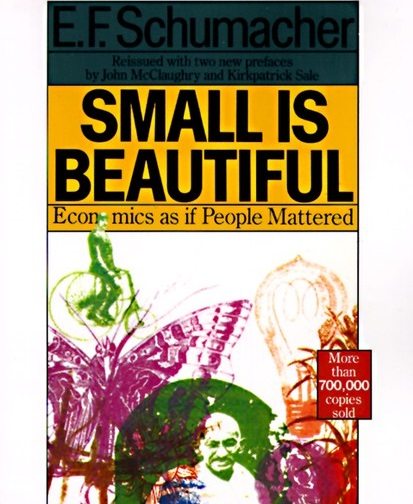
August 10, 2014; Pax on Both Houses
This past weekend was the 103rd birthday of the late Ernst Friedrich “Fritz” Schumacher. An economist and scientist, Schumacher has picked up an eclectic coterie of fans and admirers over the years, as evinced by the list of “new economy” speakers recommended by the Schumacher Center for a New Economic, including Hazel Henderson, Jeremy Rifkin, Frances Moore Lappé, Peter Barnes, and NPQ friend Gar Alperovitz. Among the luminaries who have delivered the annual E.F. Schumacher Lectures have been Benjamin Barber, Ivan Illich, John McClaughry, John McKnight, Van Jones, Bill McKibben, Kirkpatrick Sale, Winona LaDuke, and frequent NPQ contributing author Bill Schambra.
Despite the combined intellectual power of those luminaries from across the political spectrum, do Schumacher’s ideas have any relevance more than a century after his birth?
There might be some special resonance to Schumacher’s writings now, given the American preoccupation with size and scale as the measures of success and progress. Some people, like blogger Alan Archibald, think Schumacher clearly speaks to today’s problems, particularly from his Guide for the Perplexed—less well known than his iconic Small is Beautiful, but still full of impressive insights.
Sign up for our free newsletters
Subscribe to NPQ's newsletters to have our top stories delivered directly to your inbox.
By signing up, you agree to our privacy policy and terms of use, and to receive messages from NPQ and our partners.
Archibald’s commentary on Schumacher addresses the economist’s framework for understanding the world, a meditation on “philosophical mapmaking” that some readers might find too arcane and conceptual for today’s nonprofit sector, focused as it is on getting things done in a practical manner. But Schumacher was a writer and thinker who could shuttle between the extremely practical and the conceptually broad.
While working many years ago as a very young researcher and all-around do-whatever-is-needed guy at a think tank, this researcher met Schumacher, along with other famous people who transcended their fields to be able to address questions of philosophy and life—speakers like Lewis Mumford, Kenneth Boulding, and Isaac Asimov, just to name a few. Whether one agreed or disagreed with the overall thrusts of their thinking, there was always insight to be gleaned from these people, even if one might have squirmed over some of their ideas.
In honor of Schumacher, consider some of these insights for their applicability to today’s nonprofit sector’s issues and larger questions of public policy and economics:
- “Education can help us only if it produces ‘whole men.’ The truly educated man is not a man who knows a bit of everything, not even the man who knows all the details of all subjects (if such a thing were possible): the ‘whole man,’ in fact, may have very little detailed knowledge of facts & theories…but he will be truly in touch with the centre. He will not be in doubt about his basic convictions, about his view on the meaning and purpose of his life. He may not be able to explain these matters in words, but the conduct of his life will show a certain sureness of touch which stems from his inner clarity.” (from Small Is Beautiful)
- “Economic development is something much wider and deeper than economics, let alone econometrics. Its roots lie outside the economic sphere, in education, organisation, discipline and, beyond that, in political independence and a national consciousness of self-reliance.” (from Small Is Beautiful)
- “The conventional wisdom of what is now taught as economics bypasses the poor, the very people for whom development is really needed. The economics of giantism and automation is a leftover of nineteenth-century conditions and nineteenth-century thinking and it is totally incapable of solving any of the real problems of today. An entirely new system of thought is needed, a system based on attention to people, and not primarily attention to goods—(the goods will look after themselves!).” (from Small Is Beautiful)
- “The all-pervading disease of the modern world is the total imbalance between city and countryside, an imbalance in terms of wealth, power, culture, attraction and hope. The former has become over-extended and the latter has atrophied. The city has become the universal magnet, while rural life has lost its savour. Yet it remains an unalterable truth that, just as a sound mind depends on a sound body, so the health of the cities depends on the health of the rural areas. The cities, with all their wealth, are merely secondary producers, while primary production, the precondition of all economic life, takes place in the countryside. The prevailing lack of balance, based on the age-old exploitation of countryman and raw material producer, today threatens all countries throughout the world, the rich even more than the poor. To restore a proper balance between city and rural life is perhaps the greatest task in front of modern man.” (from Small Is Beautiful)
- “It is of little use trying to suppress terrorism if the production of deadly devices continues to be deemed a legitimate employment of man’s creative powers. Nor can the fight against pollution be successful if the patterns of production and consumption continue to be of a scale, a complexity, and a degree of violence which, as is becoming more and more apparent, do not fit into the laws of the universe, to which man is just as much subject as the rest of creation.” (from Small Is Beautiful)
- “(W)hile all fanaticism shows intellectual weakness, a fanaticism about the means to be employed for reaching quite uncertain objectives is sheer feeble mindedness.” (from Small Is Beautiful)
- “Education can help us only if it produces ‘whole men.’ The truly educated man is not a man who knows a bit of everything, not even the man who knows all the details of all subjects (if such a thing were possible): the ‘whole man,’ in fact, may have very little detailed knowledge of facts & theories…but he will be truly in touch with the centre. He will not be in doubt about his basic convictions, about his view on the meaning and purpose of his life. He may not be able to explain these matters in words, but the conduct of his life will show a certain sureness of touch which stems from his inner clarity.” (from Small Is Beautiful)
- “What do I miss, as a human being, if I have never heard of the Second Law of Thermodynamics? The answer is: Nothing. And what do I miss by not knowing Shakespeare? Unless I get my understanding from another source, I simply miss my life.” (from Small Is Beautiful)
- “Statistics never prove anything.” (from Small Is Beautiful)
- “The generosity of the Earth allows us to feed all mankind; we know enough about ecology to keep the Earth a healthy place; there is enough room on the Earth, and there are enough materials, so that everybody can have adequate shelter; we are quite competent enough to produce sufficient supplies of necessities so that no one need live in misery.” (from A Guide for the Perplexed)
- “Can we rely on it that a ‘turning around’ will be accomplished by enough people quickly enough to save the modern world? This question is often asked, but whatever answer is given it will mislead. The answer ‘Yes’ would lead to complacency; the answer ‘No’ to despair. It is desirable to leave these perplexities behind us and get down to work.” (from A Guide for the Perplexed)
- “I certainly never feel discouraged. I can’t myself raise the winds that might blow us or this ship into a better world. But I can at least put up the sail so that when the winds comes, I can catch it.” (from Small Is Beautiful)
If you’re a regular reader of Nonprofit Quarterly in print and the NPQ Newswire and features online, you’ll quickly see the relevance of these quotes to issues that we frequently cover here: the obsession with scale, the abandonment of a liberal arts education by young people in the sector, the grossly inadequate nonprofit and philanthropic attention to rural issues, the preoccupation of many with quantitative measures, and the challenge of fighting for solutions to complex societal problems that seem resistant to any and all counters. Our recommendation is to remember Schumacher’s advice to put up your sail so that when the wind comes, you’ll be there to catch it.—Rick Cohen












